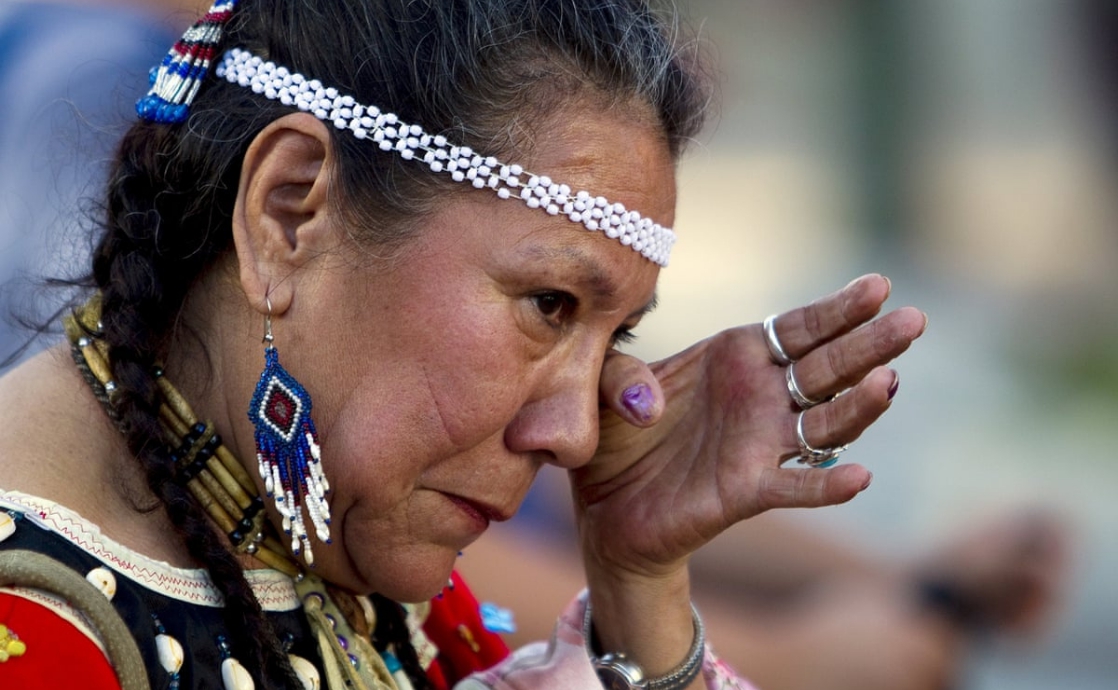The views expressed in our content reflect individual perspectives and do not represent the authoritative views of the Baha'i Faith.
Christian extremism, forced indoctrination, and religious conversion have continued in the modern age. The dark history of American Indian residential schools, testifies to that tragedy.
We may tend to think of forced conversion to a different religion as a relic of the distant past, but recently a mass grave was found at a First Nations residential school in Kamloops, British Columbia in western Canada, and at least 215 bodies of children were discovered there, all of them victims of a government-supported and church-sanctioned scheme of forced conversion.

The Tk’emlúps te Secwépemc First Nation in western Canada has long maintained that hundreds of children died at the Kamloops Indian Residential School, which operated between 1890 and 1969. Across Canada, more than 130 residential schools like the one in Kamloops existed between 1874 and 1996, and thousands of children disappeared while living in such schools.
RELATED: Did Early Explorers Practice Christianity or Coercion?
These kinds of terrible tragedies could have been completely avoided if societies and nations adhered to the Baha’i principle of:
… the independent investigation of truth; for blind imitation of the past will stunt the mind. But once every soul inquireth into truth, society will be freed from the darkness of continually repeating the past.
This Baha’i teaching – that everyone should have the right and the freedom to independently investigate the truth – does away with religious proselytizing and forced conversion. It bases religion on choice rather than coercion. It frees humanity from hidebound tradition and allows each individual to decide for themselves. Baha’u’llah, the prophet and founder of the Baha’i Faith, wrote:
The children of men are all brothers, and the prerequisites of brotherhood are manifold. Among them is that one should wish for one’s brother that which one wisheth for oneself. Therefore, it behoveth him who is the recipient of an inward or outward gift or who partaketh of the bread of heaven to inform and invite his friends with the utmost love and kindness. If they respond favourably, his object is attained; otherwise he should leave them to themselves without contending with them or uttering a word that would cause the least sadness. This is the undoubted truth, and aught else is unworthy and unbecoming.
For more than a century in Canada, however, a system of government-funded and church-run boarding schools attempted to tear out Indigenous culture by the roots, taking native children away from their families and subjecting them to mandatory forced assimilation and religious conversion. If Indigenous parents did not comply, they faced prison terms. As BBC News Canada reported:
Christian churches were essential in the founding and operation of the schools. The Roman Catholic Church in particular was responsible for operating up to 70% of residential schools, according to the Indian Residential School Survivors Society.
The United States had a similar system, with at least 357 boarding schools that operated from 1860 to 1978. In the nineteenth century, a leader of the Nez Perce American Indian tribe, Heinmot Tooyalaket (Chief Joseph, 1840-1904), put his objections to forced Christian education this way:
We do not want schools ….
they will teach us to have churches.
We do not want churches ….
they will teach us to quarrel about God.
We do not want to learn that.
We may quarrel with men sometimes
about things on this earth,
but we never quarrel about God.
We do not want to learn that.
Fifteen hundred years after Constantine fixed Catholic church doctrine, the leaders of his church were still quarreling about the nature of God – and a good case can be made that the true cause of Christ was more alive among the non-Christian innocents than the Christians in this battle. A frightening, blind, and intolerant zeal suffused in some versions of Christianity has caused men claiming good faith to do very bad things. Perhaps the worst example of this in modern times is Adolf Hitler, who wrote in his Mein Kampf: “I believe that I am acting in accordance with the will of the Almighty Creator: by defending myself against the Jew, I am fighting for the work of the Lord.”
Sadly, Christianity has not abandoned its use of force, though it has become subtler. In European colonial days, priests and missionaries who travelled with the conquerors and later traders set up churches to force their religious culture on others. When conflict with and between locals inevitably arose, the Christian community could claim persecution and appeal to the homeland for military help, which usually came and eliminated all opposition. Similar things happen still. Missionaries raised in religious monocultures who know little of the world, little of the history of their own or other Faiths, sally forth in great numbers to bring others to Jesus, paying little attention to the harm they may do: disrupting culture, teaching disrespect and intolerance for native learning, instilling a dangerous self-righteousness, creating dependence on outsiders, and fostering a distorted and dysfunctional vision of the world.
Missionaries can do good if they serve others and if they teach their religion by quiet example rather than insistence or force, but often this is not the program. Imposing your religion on anyone, the Baha’i teachings say, violates their rights as a human being.
The real problem with Christian (and Muslim) violence is that it has been a part of an enormous errant enterprise to erect the kingdom of God on Earth with a deficient plan. The problem is not with Christ (or, as you will see in later essays in this series, with Muhammad), nor with the adoration of Christ’s goodness, nor with the morality of his teachings, nor with attempts to follow them. The problem is that many of his followers, and many of those who rule in his name, have constructed kingdoms and societies that impose narrow religious views; enrich and increase the power of priests over and above the wealth and power of ordinary citizens; counted fine distinctions among theological beliefs more important than acts of goodness; created slaves and sanctioned slavery; consigned masses of people to fixed social roles, often by skin color, that debase their station and thwart their aspirations; and taught themselves to fear, disrespect, exclude, conquer and repress any believer from any one of God’s other religions.
RELATED: How Unpacking Religious Conflict Leads to Spiritual Truth
On a lesser scale, right now, there are Christian-owned businesses that would rather not serve non-Christians, and some even actively discourage non-Christian patronage. In doing so, they reject the example of Jesus, who served tax-gatherers and sinners. Many Christian children (and some adults) tell the children of other faiths that they are going to hell – seemingly unaware that Christians are not omniscient and that in making this pronouncement, they disregard Christ’s injunction in Mathew 7:1 to not judge others.
While people of all faiths long for the kingdom of God on Earth, and while the faith of Jesus clearly breathes life and hope into countless millions and has inspired great acts of compassion, any fair evaluation of the methods and ends that Christians have often used to build that holy kingdom shows that their vision is far from what most expect of the followers of Jesus.
So let’s turn next to two errors that keep Christians from being able to see the age they are in, and that keep them apart from other religions.
















Comments
Sign in or create an account
Continue with Googleor